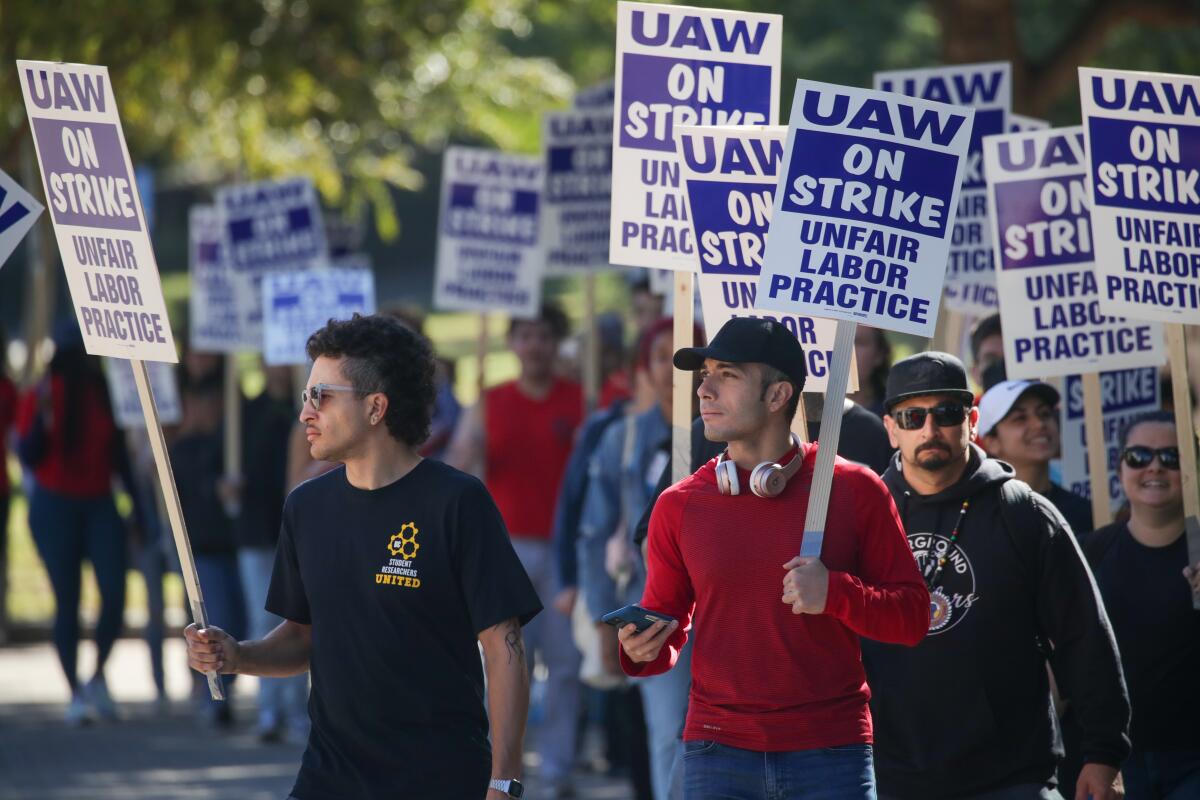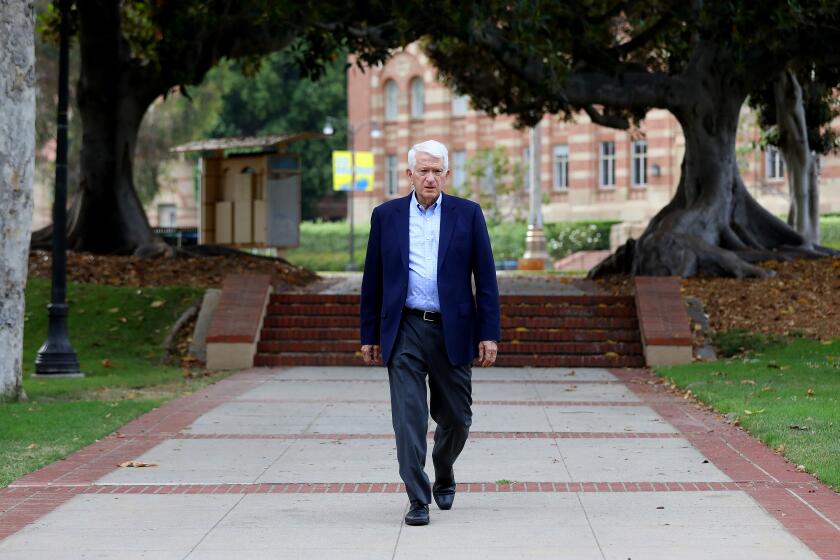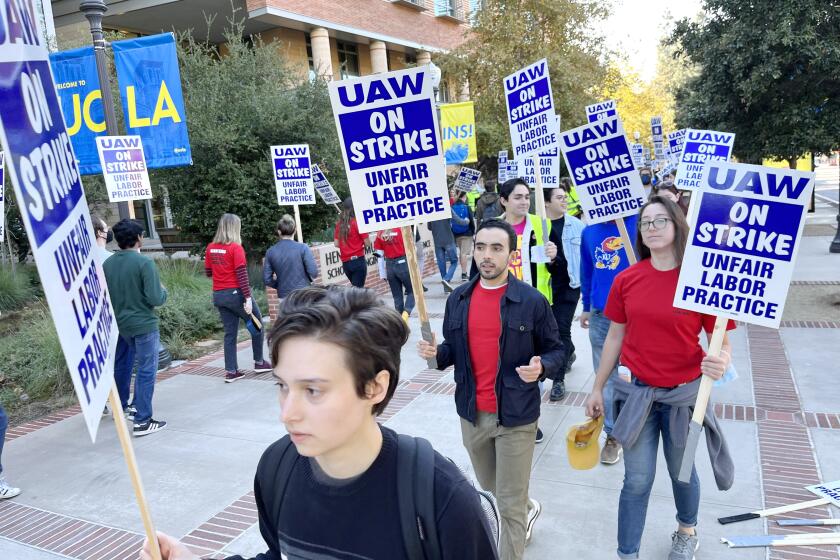UC officials charge that academic workers’ strike over pro-Palestinian protests is illegal

- Share via
As the 48,000-member UC academic workers union announced a Monday strike at UC Santa Cruz over alleged free speech violations during pro-Palestinian protests, the University of California on Friday filed a labor complaint to stop what they say is an illegal action, heightening tensions roiling the university system.
The union’s decision to strike on the 19,764-student campus — where nearly 2,000 students are in graduate school — could deal a blow to operations at a critical time during the final weeks of the spring quarter.
The targeting of UC Santa Cruz came after 79% of voting members across the state this week authorized the union leadership to call for “rolling” strikes — not over wages and benefits, but for alleged unfair labor practices against union members who supported pro-Palestinian student protests demanding that universities divest from Israel and weapons companies.
The union represents graduate student teaching assistants, researchers and other academic workers at University of California’s 10 campuses.
The Santa Cruz strike would be the first of potentially several work stoppages that the union intends to launch one by one across campuses to demand that UC administrators change their approach to pro-Palestinian protesters.
The strike threats prompted UC leaders to file their own state unfair labor practice charge against the union on Friday that called on the state’s labor board to order student workers to “cease and desist” the walkout.
UCLA Academic Senate voted against censuring Chancellor Gene Block or saying it had ‘no confidence’ in his leadership
“This strike directly violates the [collective bargaining agreement’s] no strike clauses, and has no relation to UAW members’ employment with the university. Instead, as the UAW and its members’ communications make clear, UAW strikes to support protest activity surrounding the conflict in the Middle East,” UC said in its filing with the state’s labor board.
UC officials allege the strike is illegal because of a no-strike clause in the union’s contract, ratified in late 2022, that won significant pay increases and benefit improvements for union members. The union argues that the strike is within its legal rights because it’s connected to an unfair labor practice charge workers filed in early May with the state’s labor board.
“Particularly in today’s climate, if UAW [and other unions] can disregard no-strike clauses, the University — and every other public agency in California — would face constant strikes advancing political and/or social viewpoints,” the university’s filing said.
J. Felix De La Torre, general counsel for the labor board, said that a decision on the cease and desist order sought by the university could come early next week. He added that the labor board has also offered a mediator in an effort to help resolve the dispute.
The union chose to strike at a smaller UC campus where tensions have been lower and police have not been called in to make arrests or sweeps. But the campus is not a stranger to worker protests. In 2020, the university fired dozens of grad students from their teaching assistant positions after strikes there. At least 17 arrests were made during a related student-led demonstration.
This spring, UCLA, UC Irvine and UC Berkeley have been particularly volatile flashpoints of pro-Palestinian protests. A violent mob attack on a UCLA pro-Palestinian encampment last month has led to multiple investigations into how the university handled the melee and the delayed police response to it.
For two weeks, students at UC Santa Cruz, including unionized graduate students, have maintained a pro-Palestinian encampment on campus in support of divestment from Israel. The strike comes as protesters and the university administration have indicated that they’ve reached a standstill. Protest leaders said on Thursday that they were “under imminent threat of police sweep” after they said the university gave them formal notice to “cease all camping activities on university property.”
In a letter to the Santa Cruz campus community on Friday, Campus Provost Lori Kletzer said the university would work to minimize the strike’s disruption “especially given the many educational and research disruptions that have affected students and researchers in recent years.”
No length of time was given for the strike, which the union announced with a promotional video on the social media site X, but a UC Santa Cruz union member said it could last through June 30.
Rafael Jaime, United Auto Workers Local 4811 co-president and a doctoral candidate in UCLA’s English department, said that to resolve the strike the union needs “to see a real commitment from the university to respect our rights to free speech and peaceful protest on campus.”
A first step would be for administrators to reconsider discipline and suspension notices that have been sent to some student workers involved in the protests, he said.
Speaking before the strike decision, Jaime said a strike would mean “all academic work would cease, including research, teaching and grading.”
United Auto Workers Local 4811, which represents 48,000 student workers in the University of California system, authorized a strike alleging their workers’ rights were violated in actions against pro-Palestinian protests.
Student workers will receive $500 weekly in strike pay, or about 33% less than the average teaching assistant makes for a 20-hour work week, he said.
Jess Fournier, a union representative at UC Santa Cruz, said that while the alleged unfair labor practices did not take place on their campus, workers there view the university’s response as a threat to workers across the UC system.
“If members of our academic community are being maced and beaten for peacefully protesting, our ability to collectively organize as workers, and our fundamental right to have free speech and protest on any issue is threatened.”
Fournier said academic workers at the university would continue their walkouts over the coming months until the university resolves the alleged unfair labor practices.
“If they refuse to do so, more campuses may be called as necessary. Workers on every campus are extremely fired up about this,” they said. “This is a statewide issue. Even though we are the ones leading the charge. It seems very likely other campuses will follow unless and until these unfair labor practices are resolved.”
Earlier this week, the California Labor Federation voted to grant a strike sanction to the union, a designation that encourages other unions and their members to honor any potential picket lines if their contracts allow them to.
“It’s an act of solidarity, it’s a symbol and a message for all workers in California,” said Lorena Gonzalez, head of the federation and a former state assemblywoman. “Whether you agree or disagree with what the protesters were doing, the larger question is, should workers be retaliated against for their right to free speech and protest?”
Experts say the union is taking a novel approach in its strike because it is not about contract matters but free speech.
The union complaint focuses on the arrests of pro-Palestinian graduate student protesters at UCLA and suspensions and other discipline at UC San Diego and UC Irvine. It accuses the universities of retaliating against student workers and unlawfully changing workplace policies to suppress pro-Palestinian speech.
In a letter sent to graduate student workers on Wednesday, UC officials warned students against striking.
“Participating in the strike does not change, excuse, or modify, an employee’s normal work duties or expectations. And, unlike a protected strike, you could be subject to corrective action for failing to perform your duties,” the unsigned letter from the UC office of the president said.
Less than 24 hours after a violent attack on a pro-Palestinian camp at UCLA, officers pulled apart barricades as they tore down the encampment and made arrests.
The letter also defended universities using riot police to break up protests.
“We have a duty to ensure that all speech can be heard, that our entire community is safe, and that our property and common areas are accessible for all. These duties require the UC to take action when protests endanger the community and violate our shared norms regarding safe behavior and the use of public spaces,” it said.
The strike vote comes as campuses throughout the UC system have experienced tensions and protests over the Israel-Hamas war, including a violent mob attack on a pro-Palestinian encampment at UCLA and the arrest of 47 protesters at UC Irvine on Wednesday.
UC Riverside and UC Berkeley have reached agreements with protesters to end encampments and explore divestment from weapons companies. Leaders at those universities have rejected calls to target Israel specifically or for academic boycotts against exchange programs and partnerships with Israeli universities, as some protesters have demanded.
While some Jewish students have supported pro-Palestinian encampments, national Jewish groups have criticized the divestment movement. They say it is antisemitic because it aims to delegitimize the only predominantly Jewish nation.
In Santa Cruz, emails and calls from The Times to several Jewish student organizations seeking comment on the strike and pro-Palestinian protests were not immediately returned.
“We are aware of the challenges happening on campus and right now are focusing all of our attention on supporting students and working with campus administration,” said an auto-reply from Becka Ross, the executive director of the Santa Cruz Hillel.
Times staff writer Suhauna Hussain contributed to this report.
More to Read
Sign up for Essential California
The most important California stories and recommendations in your inbox every morning.
You may occasionally receive promotional content from the Los Angeles Times.















